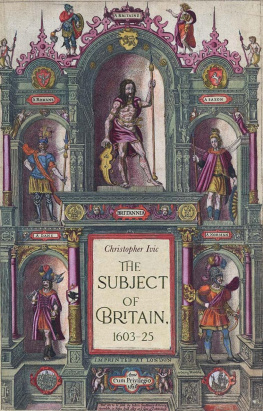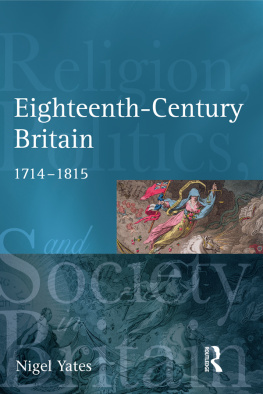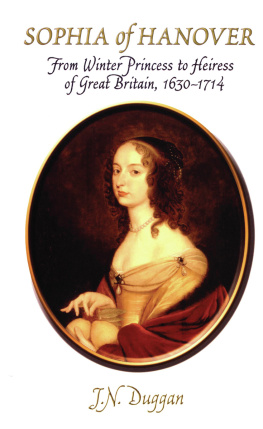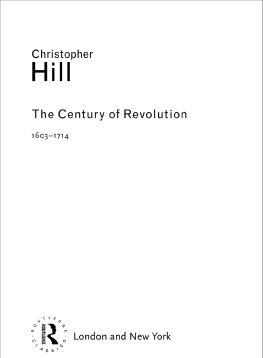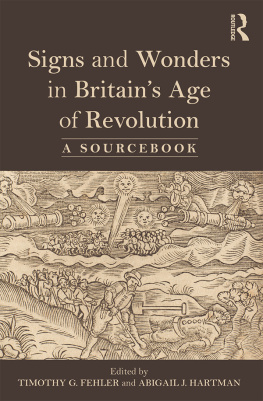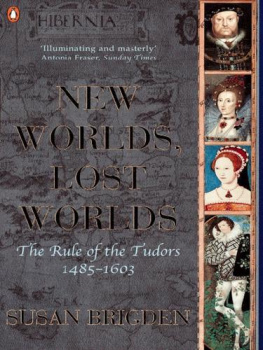The Post-Reformation
Religion, Politics and Society in Britain Series
The Conversion of Britain: Religion, Politics and Society in Britain,
600-800
Barbara Yorke
Religion and Society in Twentieth-Century Britain
Callum G. Brown
The Post-Reformation
Religion, Politics and Society in Britain 16031714
John Spurr
University of Swansea
First published 2006 by Pearson Education Limited
Published 2014 by Routledge
2 Park Square, Milton Park, Abingdon, Oxon OX14 4RN
711 Third Avenue, New York, NY 10017, USA
Routledge is an imprint of the Taylor & Francis Group, an informa business
Copyright 2006, Taylor & Francis.
The right of John Spurr to be identified as author of this work has been asserted by him in accordance with the Copyright, Designs and Patents Act 1988.
All rights reserved. No part of this book may be reprinted or reproduced or utilised in any form or by any electronic, mechanical, or other means, now known or hereafter invented, including photocopying and recording, or in any information storage or retrieval system, without permission in writing from the publishers.
Notices
Knowledge and best practice in this field are constantly changing. As new research and experience broaden our understanding, changes in research methods, professional practices, or medical treatment may become necessary.
Practitioners and researchers must always rely on their own experience and knowledge in evaluating and using any information, methods, compounds, or experiments described herein. In using such information or methods they should be mindful of their own safety and the safety of others, including parties for whom they have a professional responsibility.
To the fullest extent of the law, neither the Publisher nor the authors, contributors, or editors, assume any liability for any injury and/or damage to persons or property as a matter of products liability, negligence or otherwise, or from any use or operation of any methods, products, instructions, or ideas contained in the material herein.
ISBN 13: 978-0-582-31906-6 (pbk)
British Library Cataloguing-in-Publication Data
A catalogue record for this book is available from the British Library
Library of Congress Cataloging-in-Publication Data
Spurr, John.
The post-Reformation : religion, politics, and society in Britain, 16031714 / John Spurr.
p. cm. (Religion, politics, and society in Britain)
Includes bibliographical references and index.
ISBN 0582319064 (alk. paper)
1. Great BritainChurch history17th century. 2. Christianity and politicsGreat Britain17th century. 3. Christian sociologyGreat BritainHistory17th century. I. Title. II. Series.
BR756.S68 2006
274.1 06dc22
2005055584
Typeset in 10/13.5pt Sabon by 35
To Sam, Rene and Ivor
Contents
Select bibliography
No understanding of British history is possible without grappling with the relationship between religion, politics and society. How that should be done, however, is another matter. Historians of religion, who have frequently thought of themselves as ecclesiastical historians, have had one set of preoccupations. Political historians have had another. They have both acknowledged, however, that both religion and politics can only be understood, in any given period, in a social context. This series makes the interplay between religion, politics and society its preoccupation. Even so, it does not assume that what is entailed by religion and politics remains the same throughout, to be considered as a constant in separate volumes merely because of the passage of time.
In its completed form the series will have probed the nature of these links from c.600 to the present day and offered a perspective, over such a long period, which has not before been attempted in a systematic fashion. There is, however, no straitjacket that requires individual authors to adhere to a common understanding of what such an undertaking involves. Even if there could be a general agreement about concepts, that is to say about what religion is or how politics can be identified, the social context of such categorisations is not static. The spheres notionally allocated to the one or to the other alter with circumstances. Sometimes it might appear that they cannot be separated. Sometimes it might appear that they sharply conflict. Each period under review will have its defining characteristics in this regard.
It is the Christian religion, in its manifold institutional manifestations, with which authors are overwhelmingly concerned since it is with conversion that the series begins. It ends, however, with a volume in which Christianity exists alongside other world religions but in a society frequently perceived to be secular. Yet, what de-Christianisation is taken to be depends upon what Christianisation has been taken to be. There is, therefore, a relationship between topics which are tackled in the first volume, and those considered in the last, which might at first sight seem unlikely. In between, of course are the Christian Centuries which, despite their label, are no less full of boundary disputes both before and after the Reformation. The perspective of the series, additionally, is broadly pan-insular. The Britain of 600 is plainly not the Britain of the early twenty-first century. However, the current political structures of Britain-Ireland have arguably owed as much to religion as to politics. Christendom has been inherently ambiguous.
It would be surprising if readers, not to mention authors, understood the totality of the picture that is presented in the same way. What is common, however, is a realisation that the narrative of religion, politics and society in Britain is not a simple tale that points in a single direction but rather one of enduring and by no means exhausted complexity.
Keith Robbins, November 2005
W riting this book presented a double challenge. My account had to reveal a world that is very different from our own, especially in its religious and political preoccupations. But it also had to convey something of the seventeenth centurys dynamism, of the changes and struggles that had by 1714 left British society more recognisably modern than it was in 1603. Religion was at the heart of the story. Religious beliefs, values and practices cannot easily or helpfully be separated from the social, political and personal life of the period. But that does not mean religion can be explained in terms of something else. Religion is not a vehicle for liberty, democracy, progress, tolerance, patriarchy or the bourgeois work ethic. It is primarily the bundle of human beliefs and practices about and towards the supernatural, the creator, the next life, and the significance of this life. Religion is expressed in the personal and private form of piety. It takes on institutional form in the shape of churches, clergies, doctrines and church services. So there are numerous ways of writing the history of religion in seventeenth-century Britain. In what follows I have not pursued a narrow ecclesiastical or denominational history, but neither have I subsumed the spiritual experience of the seventeenth century to the political narrative.


